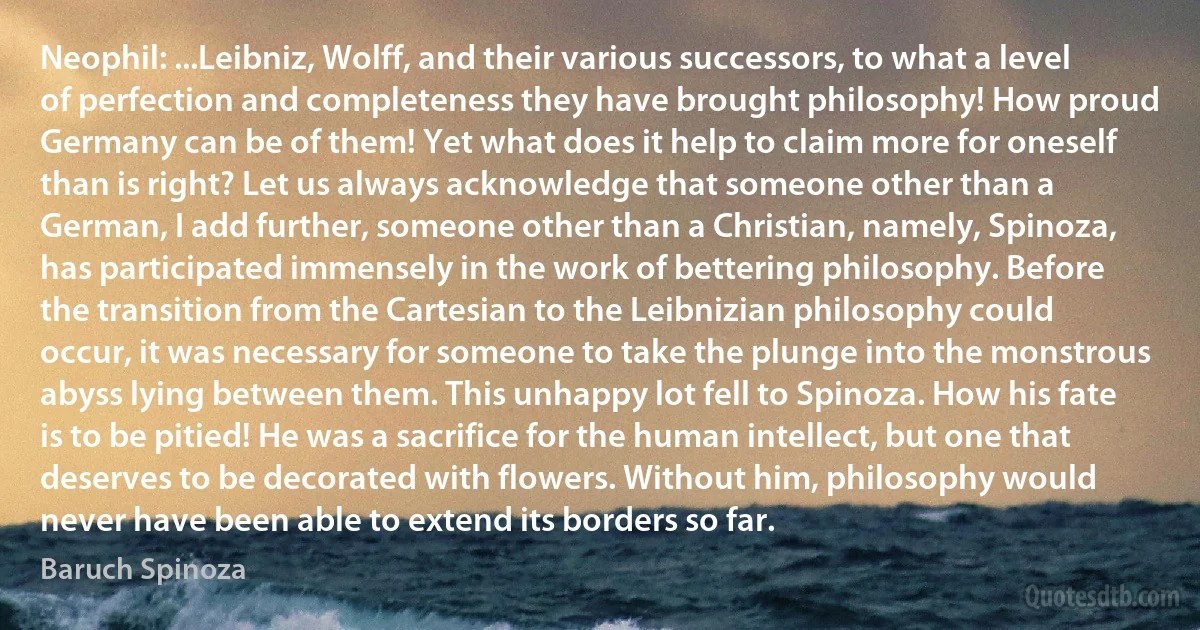
Neophil: ...Leibniz, Wolff, and their various successors, to what a level of perfection and completeness they have brought philosophy! How proud Germany can be of them! Yet what does it help to claim more for oneself than is right? Let us always acknowledge that someone other than a German, I add further, someone other than a Christian, namely, Spinoza, has participated immensely in the work of bettering philosophy. Before the transition from the Cartesian to the Leibnizian philosophy could occur, it was necessary for someone to take the plunge into the monstrous abyss lying between them. This unhappy lot fell to Spinoza. How his fate is to be pitied! He was a sacrifice for the human intellect, but one that deserves to be decorated with flowers. Without him, philosophy would never have been able to extend its borders so far.
Baruch SpinozaRelated topics
able add bettering cartesian christian claim completeness fell far fate help human lying necessary pity right take transition unhappy work yet someone LeibnizRelated quotes
You know that my ancestors were the most Christian emperors of the great nation of Germany, the Catholic kings of Spain, the archdukes of Austria, and the dukes of Burgundy, who all were, until death, faithful sons of the Roman Church.... I am therefore resolved to maintain everything which these my forebears have established to the present...and to settle this matter I will use all my dominions and possessions, my friends, my body, my blood, my life, and my soul. It would be a disgrace for you and me, the illustrious and renowned nation of Germany, privileged and pre-eminent as protector and defender of the Catholic faith, if heresy, or even just the suspicion of heresy, and the degradation of the Christian religion were to return to the hearts of men in our time to our perpetual dishonour.

Charles V, Holy Roman Emperor
The power to guess the unseen from the seen, to trace the implication of things, to judge the whole piece by the pattern, the condition of feeling life, in general, so completely that you are well on your way to knowing any particular corner of it - this cluster of gifts may almost be said to constitute experience, and they occur in country and in town, and in the most differing stages of education. If experience consists of impressions, it may be said that impressions are experience, just as (have we not seen it?) they are the very air we breathe. Therefore, if I should certainly say to a novice, "Write from experience, and experience only," I should feel that this was a rather tantalizing monition if I were not careful immediately to add, "Try to be one of the people on whom nothing is lost!"

Henry James
For what advantage is it, that the world enjoys profound peace, if thou art at war with thyself? This then is the peace we should keep. If we have it, nothing from without will be able to harm us. And to this end the public peace contributes no little: whence it is said, ‘That we may lead a quiet and peaceable life.' But if any one is disturbed when there is quiet, he is a miserable creature. Seest thou that He speaks of this peace which I call the third (inner, ed.) kind? Therefore when he has said, ‘that we may lead a quiet and peaceable life,' he does not stop there, but adds ‘in all godliness and honesty.' But we cannot live in godliness and honesty, unless that peace be established. For when curious reasonings disturb our faith, what peace is there? or when spirits of uncleanness, what peace is there?

John Chrysostom
We welcome the peace with the militarily and politically entirely collapsed Rumania as a world judgment in world history...Is there anyone to-day who, after the overthrow of the whole of the East, would still doubt a German victory?...Anyone who visualises the collapse of Rumania, this military collapse in three months, this complete political crash of the State that saw itself compelled to sue for peace, must feel that something like a world judgment in world history is taking place...Then there is the question of the war indemnity. In the debate on the Treaty of Brest Litovsk I said that, surely it could not be contradicted from any part of this House that a war indemnity must be demanded from Rumania If Germany receives an indemnity, then it is a matter of indifference to me what it is called, either in the case of the present Treaty or any further ones.

Gustav Stresemann
Henlein declared that Hitler told him, that he was to carry out an action against the Czceho-Slovak Republic particulary in such way as was originally planned by him. From the German point of view, this time was not convient due to the following reasons: Siegfired line on the French borders will be finished in approximately eight weeks, numerous German army is needed in Austria, whose withdrawal is also expected within the course of eight weeks, and finally Hitler will not allow to dictate himself when to start the action. He would start it only when he is a hunderd percent convicted that it will finish a full success.. Henlein declared further that, according to Hitler Slovakia will be returned to Hungary where Slovaks will obtain autonomy and that part of Czechia inhabitated by Czechs and Moravians will be joined to Germany with and extensive autonomy.

János Esterházy
